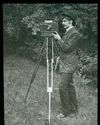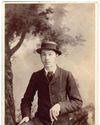
The primary purpose of an in-body image stabilisation (IBIS) system is to compensate for the accidental movements that occur when photographers are handholding a camera and therefore enable sharp images to be captured when using slower shutter speeds than normal. It works by detecting the camera-shake and shifting the sensor by tiny amounts to correct for it so that the image isn’t blurred.
The fact that the sensor can be moved very precisely enables another feature, usually called something like Pixel Shift Multi Shot mode or High Res Shot mode, that is now found in some cameras from Fujifilm, Olympus / OM System, Panasonic, Pentax and Sony. When the mode is activated, the camera takes a series of images, shifting the sensor by a tiny amount, sometimes half the width of a pixel, between each one. These images can then be combined into one image to either create a larger image with more detail, or in the early incarnations in Sony and Pentax cameras, images that have the same pixel count as normal but have slightly better detail, colour and tonal gradations.
In some cases, the images are combined using software running on a computer, but Olympus / OM System, Panasonic and Pentax cameras can composite the images in-camera when their High Res Shot mode or High Resolution modes are used. The most recent Olympus and OM System cameras, including the OM-D E-M1X, OM-1 and the OM-5 feature two modes: one that is suitable for use when the camera is mounted on a tripod and the subject is motionless; and the other which can cope with a little subject movement and when the camera is handheld. In tripod mode, the cameras produce 80MP images; while in handheld mode they produce 50MP images.
Using software
この記事は Amateur Photographer の January 17, 2023 版に掲載されています。
7 日間の Magzter GOLD 無料トライアルを開始して、何千もの厳選されたプレミアム ストーリー、9,000 以上の雑誌や新聞にアクセスしてください。
すでに購読者です ? サインイン
この記事は Amateur Photographer の January 17, 2023 版に掲載されています。
7 日間の Magzter GOLD 無料トライアルを開始して、何千もの厳選されたプレミアム ストーリー、9,000 以上の雑誌や新聞にアクセスしてください。
すでに購読者です? サインイン

Calling The Shots: A Queer History of Photography
Offering an unprecedented view of photographic history through a queer lens, this is a wonderful and powerful book, says

Large-aperture standard zoom, too
SONY has also revealed a new premium standard zoom, the FE 28-70mm F2 GM.

Super-fast, high-res Sony Alpha Ai II
SONY has announced its new professional full-frame flagship camera, the Alpha A1 II.

39 awesome accessories
Our round-up of the best accessories we've used and reviewed this year, along with some old favourites. There's something here for every budget, starting from just £7, including tripods, bags, filters and much more

Such a thing as society
This autumn sees the launch of a major new book and exhibition devoted to examining the multiplicities of photography during 1980s Britain. Peter Dench finds out more

Join Club
The sociable Canvey Island Photographic Club is keen to grow its in-person meet ups

Capturing flight
Winners and finalists of Bird Photographer of the Year share their tips for success with Hollie Latham Hucker

140 years of change
AP has become the world’s oldest surviving consumer photo magazine because we have moved with the times, says Nigel Atherton

Preserving history in platinum
A deep dive into the meticulous art of platinum printing, and the collaboration between the Royal Geographical Society and Salto Ulbeek. Mike Crawford explores how they brought historical photographs to life with enduring beauty and precision

Life in the past lane
What was life like for an amateur photographer in 1884? John Wade takes a trip back in time